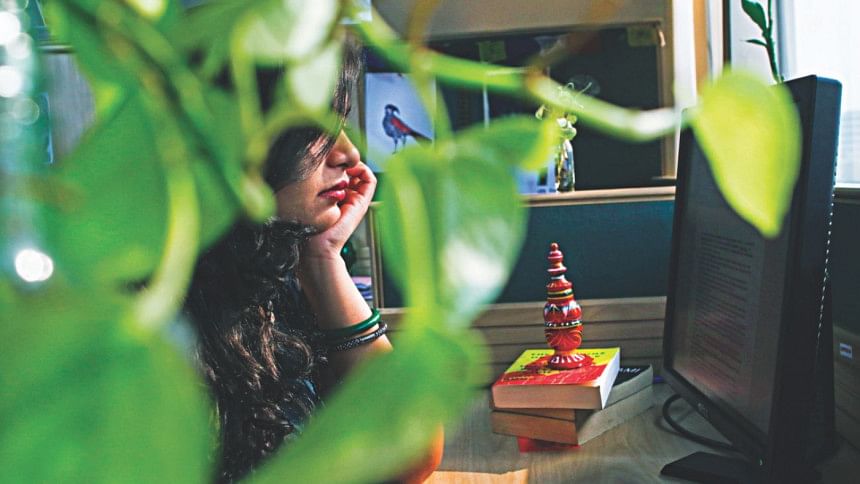A vibrant workplace for happier employees

Illumination from the fluorescent lights fails to reach the cubicle at the end of the room as a girl leans over her laptop. She's scribbling over her notebook and she can only hear the faint sound of rain hitting the window. Suddenly, she feels her chest tighten as she looks at the clock ticking above her. She tries to distract herself by looking around, but now she feels distant from everyone around her and finds herself unable to breathe properly. The faint light turns dark and she sits in the corner, unable to move.
An anxiety attack can happen out of the blue, and to maintain our capacity to address issues related to mental health and wellbeing, we need to recognise the daily triggers that cause us harm every day. Mental health is not only related to mental illnesses but also how you feel about yourself and how you adjust to life events. According to the World Health Organization (WHO), depression and anxiety are the two most common causes of mental illness and the total number of people living with depression in the world is 322 million. In Bangladesh, over 7.3 million of the adult population struggle with depression every day.
The damage that is caused by mental illnesses has traditionally been hidden behind a screen of stigma. To create awareness for this cause, World Mental Health Day was observed for the first time on October 10, 1992. Each year a specific theme is assigned to this day and this year's theme is "Young people and mental health in a changing world." The youth in the modern era, in their transformative phases, have to face various kinds of mental pressures—whether it is within their home, at their workplaces or in their social circles. With mounting competition, expectations and pressures from all directions, many don't know how to overcome their anxieties and other mental setbacks, since they are seldom equipped with sufficient knowledge about these issues.
In fact, quite a lot can be done to help build mental resilience that can prevent mental distress and illness among adolescents and young adults, and help manage and recover from mental illness. Just some simple changes in one's life, such as creating a positive and relaxing atmosphere, can play an important function here. For example, an employed young adult spends a considerable time in their workplace, and an excellent method of reducing stressors is being exposed to a healthy surrounding. In order to remain productive and not burn out under work pressures, we need to acknowledge our daily stressors and make a conscious effort to take care of our physical as well as mental wellbeing.
Imagine a fall morning when you're eager to start the day and you head into your office. As you pass through a common area, you see a group of coworkers in a collaborative work session. They're seated in a conference room where natural light seeps through the huge floor-to-ceiling windows providing plenty of light and greenery. Imagine getting to your desk and sitting down, with a view of an open space where you can look around and greet your colleagues without needing to get out of your cubicle.
Imagine being surrounded by decorative elements that invoke nature and keep you connected to the natural world even while you're inside. You look at the small plant that you watered the day before, and you make yourself a cup of coffee at the counter beside you, all to your liking. Imagine an educational display in the office lobby—a constant reminder for you and your company's visitors of just what it is that makes your workplace so special. The day might get stressful—there's a deadline coming by. You take some time to yourself and sit in a quiet room that's been designed to de-stress. Or you can go to the corner and engage yourself in activities like playing board games or a session of carom. You look at your colleague come out of the daycare with a smile on her face, and you can hear children laugh and play in the daycare with a dedicated caregiver.
You settle into your seat at the end of a full day's work, feeling the positive effects of having spent your day in an environment filled with clean indoor air, with plenty of exposure to natural light. Your mind is clear and your energy and spirits high, knowing that your productivity was high and any stress that you encountered could be fixed with a few simple activities.
This is how it feels like to work at an inclusive office space, and this is a unique example of how organisations can take concerted steps to prioritise and nurture the wellbeing of their employees. Any workspace's work culture should be one where constant attention is paid to nurturing the mental health of all employees. A great example would be SAJIDA Foundation's office, where similar elements of the workspace can be found.
Work-related pressures have been linked with the leading causes of stress, depression or anxiety. For an employee, a fundamental human need is having the basic necessities fulfilled at their workspace, and, unfortunately, very few organisations in Bangladesh and around the world recognise this. Creating an office culture that is inclusive for all and takes into account one's mental wellbeing may not be an easy process, but examples set by organisations like SAJIDA Foundation are also important to mark the way forward. Every employer has a responsibility towards the health and wellbeing of his or her employees. Organising more dialogues and addressing different mental health issues in the workplace can help build a healthy lifestyle for employees, and, at the end of the day, help us flourish and grow as not just staff, but also as individuals, allowing us to thrive. This should not just be a trend but a lifestyle change.
At the end of the day, we should not just "celebrate" a day in recognition of the importance of mental health, but actually practise positive and healthy living, figure out what really makes us the best versions of ourselves, and bring about changes needed to achieve this. And above all, may we never fear talking about mental health issues openly, and seek help when help is needed.
Here's to health, happiness and dignity for all this World Mental Health Day.
Raida AK Reza is a communications coordinator in SAJIDA Foundation.





Comments